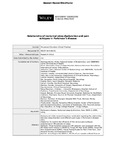Relationship of Nocturnal Sleep Dysfunction and Pain Subtypes in Parkinson's Disease
| dc.contributor.author | Martinez-Martin, P | |
| dc.contributor.author | Rizos, AM | |
| dc.contributor.author | Wetmore, JB | |
| dc.contributor.author | Antonini, A | |
| dc.contributor.author | Odin, P | |
| dc.contributor.author | Pal, S | |
| dc.contributor.author | Sophia, R | |
| dc.contributor.author | Carroll, Camille | |
| dc.contributor.author | Martino, D | |
| dc.contributor.author | Falup-Pecurariu, C | |
| dc.contributor.author | Kessel, B | |
| dc.contributor.author | Andrews, T | |
| dc.contributor.author | Paviour, D | |
| dc.contributor.author | Trenkwalder, C | |
| dc.contributor.author | Chaudhuri, KR | |
| dc.date.accessioned | 2018-12-14T09:23:35Z | |
| dc.date.available | 2018-12-14T09:23:35Z | |
| dc.date.issued | 2019-01 | |
| dc.identifier.issn | 2330-1619 | |
| dc.identifier.issn | 2330-1619 | |
| dc.identifier.uri | http://hdl.handle.net/10026.1/13032 | |
| dc.description.abstract |
© 2018 International Parkinson and Movement Disorder Society Background: Little research has been conducted regarding the relationship between sleep disorders and different pain types in Parkinson's disease (PD). Objective: To explore the influence of the various pain subtypes experienced by PD patients on sleep. Methods: Three hundred consecutive PD patients were assessed with the PD Sleep Scale-Version 2 (PDSS-2), King's PD Pain Scale (KPPS), King's PD Pain Questionnaire (KPPQ), Visual Analog Scales for Pain (VAS-Pain), and Hospital Anxiety and Depression Scale. Results: According to the PDSS-2, 99.3% of our sample suffered from at least one sleep issue. Those who reported experiencing any modality of pain suffered significantly more from sleep disorders than those who did not (all, P < 0.003). The PDSS-2 showed moderate-to-high correlations with the KPPS (rS = 0.57), KPPQ (0.57), and VAS-Pain (0.35). When PDSS-2 items 10 to 12 (pain-related) were excluded, the correlation values decreased to 0.50, 0.51, and 0.28, respectively, while these items showed moderate-to-high correlations with KPPS (0.56), KPPQ (0.54), and VAS-Pain (0.42). Among the variables analyzed, multiple linear regression models suggested that KPPS and KPPQ were the most relevant predictors of sleep disorders (as per the PDSS-2), although following exclusion of PDSS-2 pain items, depression was the relevant predictor. Depression and anxiety were the most relevant predictors in the analysis involving the VAS-Pain. Regression analysis, considering only the KPPS domains, showed that nocturnal and musculoskeletal pains were the best predictors of overall nocturnal sleep disorder. Conclusions: Pain showed a moderate association with nocturnal sleep dysfunction in PD. Some pain subtypes had a greater effect on sleep than others. | |
| dc.format.extent | 57-64 | |
| dc.format.medium | Electronic-eCollection | |
| dc.language | en | |
| dc.language.iso | en | |
| dc.publisher | Wiley | |
| dc.subject | Parkinson's disease | |
| dc.subject | nocturnal sleep dysfunction | |
| dc.subject | pain | |
| dc.subject | PDSS-2 | |
| dc.subject | KPPS | |
| dc.subject | KPPQ | |
| dc.title | Relationship of Nocturnal Sleep Dysfunction and Pain Subtypes in Parkinson's Disease | |
| dc.type | journal-article | |
| dc.type | Journal Article | |
| plymouth.author-url | https://www.webofscience.com/api/gateway?GWVersion=2&SrcApp=PARTNER_APP&SrcAuth=LinksAMR&KeyUT=WOS:000456195400010&DestLinkType=FullRecord&DestApp=ALL_WOS&UsrCustomerID=11bb513d99f797142bcfeffcc58ea008 | |
| plymouth.issue | 1 | |
| plymouth.volume | 6 | |
| plymouth.publication-status | Published | |
| plymouth.journal | Movement Disorders Clinical Practice | |
| dc.identifier.doi | 10.1002/mdc3.12694 | |
| plymouth.organisational-group | /Plymouth | |
| plymouth.organisational-group | /Plymouth/Faculty of Health | |
| plymouth.organisational-group | /Plymouth/Faculty of Health/Peninsula Medical School | |
| plymouth.organisational-group | /Plymouth/REF 2021 Researchers by UoA | |
| plymouth.organisational-group | /Plymouth/REF 2021 Researchers by UoA/UoA03 Allied Health Professions, Dentistry, Nursing and Pharmacy | |
| plymouth.organisational-group | /Plymouth/Research Groups | |
| plymouth.organisational-group | /Plymouth/Research Groups/FoH - Applied Parkinson's Research | |
| plymouth.organisational-group | /Plymouth/Research Groups/FoH - Community and Primary Care | |
| plymouth.organisational-group | /Plymouth/Research Groups/Institute of Translational and Stratified Medicine (ITSMED) | |
| plymouth.organisational-group | /Plymouth/Research Groups/Institute of Translational and Stratified Medicine (ITSMED)/CCT&PS | |
| plymouth.organisational-group | /Plymouth/Research Groups/Plymouth Institute of Health and Care Research (PIHR) | |
| plymouth.organisational-group | /Plymouth/Users by role | |
| plymouth.organisational-group | /Plymouth/Users by role/Academics | |
| dc.publisher.place | United States | |
| dcterms.dateAccepted | 2018-09-26 | |
| dc.rights.embargodate | 2019-11-8 | |
| dc.identifier.eissn | 2330-1619 | |
| dc.rights.embargoperiod | Not known | |
| rioxxterms.versionofrecord | 10.1002/mdc3.12694 | |
| rioxxterms.licenseref.uri | http://www.rioxx.net/licenses/all-rights-reserved | |
| rioxxterms.licenseref.startdate | 2019-01 | |
| rioxxterms.type | Journal Article/Review |


